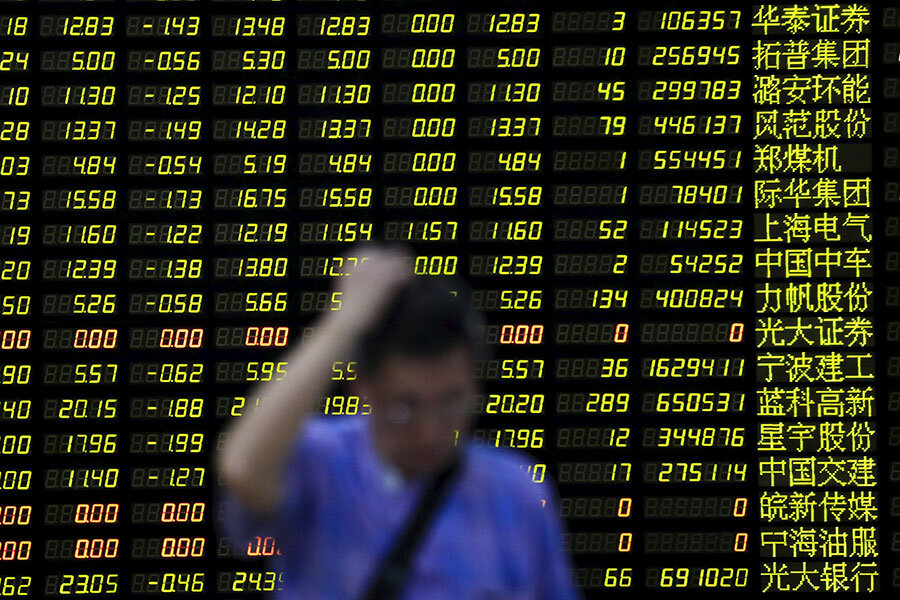From stock market tumble, a more realistic view of China's economy
Loading...
| Washington
The news out of China isn’t good – anyone who knows the meaning of the color red on financial charts can tell you that.
After a precipitous rise in the spring, stock prices there have been plunging based on investor worries of a weakening economy – including the risk of a recession-like “hard landing” for China. That, in turn, would exert some slowing influence on the global economy, which helps explain the recent sharp downdrafts in United States stock markets, which continued Tuesday.
Still, seen through another lens, the economic picture looks different.
For one, the hard landing scenario may not come to pass. Some prominent forecasters see the economy there cooling rather than diving off a cliff.
In addition, a slowdown in China’s growth was necessary and inevitable, many economists say. That’s because China’s growth had been rooted in unsustainably surging investment in factories, property and other fixed assets. Some market turbulence is almost inevitable amid the curbing of financial excesses.
But perhaps most significant is that with or without a sharp slowdown, the bloom is off China’s rose – and that may be a good thing. The popular view of China as an unstoppable economic giant was never accurate. The market plunge may prompt people inside and outside China to take a more realistic view that incorporates China’s weaknesses and the transition from its liftoff era to the likelihood of slower growth in the future.
“One hears much less of late about the Chinese model and more about the Chinese reality,” writes Richard Haass, president of the Council on Foreign Relations, in a commentary published last week. “Aside from slowing growth, that reality includes severe environmental damage…. [And] China’s aging population, an unintended consequence of its draconian one-child policy, poses another threat to long-term prosperity.”
This new dose of realism about China is potentially healthy, but it’s also complicated, notably because of the risk that economic challenges could spill over into political unrest. Already, there are reportedly signs of tension within the ruling Chinese Communist Party (CCP), partly due to President Xi Jinping’s blend of centralized personal control and reformist zeal. He’s pursuing sweeping economic changes alongside an avowed crackdown on official corruption.
Despite the short-term turmoil, many China watchers argue that a success story would be if the economic bumps become steps along Xi’s route to an economy that emphasizes freer markets and more domestic consumption, rather than growth fueled by exports and government-led investment.
What’s clearest to all is that China is in a period of significant change.
And along with silver linings, there are risks for the rest of the world as well as for China’s government and people.
“Most dangerous of all, a struggling China could be tempted to turn to foreign adventurism to placate a public frustrated by slower economic growth and an absence of political freedom,” Mr. Haass says. A case in point may already be unfolding in the South China Sea, and he advises America to caution China against provocative moves while also holding out a ready hand economic partnership between the nations.
Moreover, if China’s economy is slowing more than had been expected, that pulls some wind out of the world economy, especially in neighboring Asian nations.
So global investors were watching with no small interest Tuesday as China announced an interest-rate cut designed to calm the storm – and stocks fell anyway from Shanghai to New York.
Still, economists aren’t necessarily adopting “hard-landing” forecasts for China. Julian Jessop of the forecasting firm Capital Economics in London wrote in a Monday analysis that the recent economic data from China “are not weak enough to justify fears of a ‘hard landing,’ especially with the full impact of policy stimulus yet to come through.”
China’s policymakers have financial firepower at their disposal, too, to do substantially more in the way of stimulus as needed.
Kamel Mellahi, of Britain’s Warwick Business School, says in an e-mail interview that he expects China’s economy to weather its current storm in financial markets. Xi’s government, he says, is very focused on navigating the long-term reforms outlined by the CCP in the past few years.
Those reforms range from an overhaul of banking rules to a new system of farm property rights, and other steps toward modern regulatory systems and better market-based allocation of resources.
“China is trying to calm the stock market and at the same time address short-term domestic financial problems. But I don’t think China is going to take major decisions that could jeopardize its long-term objectives,” says Mr. Mellahi, a professor of strategic management who follows China.
The road ahead won’t necessarily be smooth, and the current turbulence can be viewed as an early reminder of that.
“The Chinese economy will not, and should not, grow as fast as it used to,” Mellahi says. “The ultimate goal is to achieve a balanced, more sustained growth level.”
[Editor's note: This story has been amended to clarify the drivers of China's economy and the rationale for reported friction within its leadership. It also omits an earlier reference to political change as a result of a severe economic crisis.]








